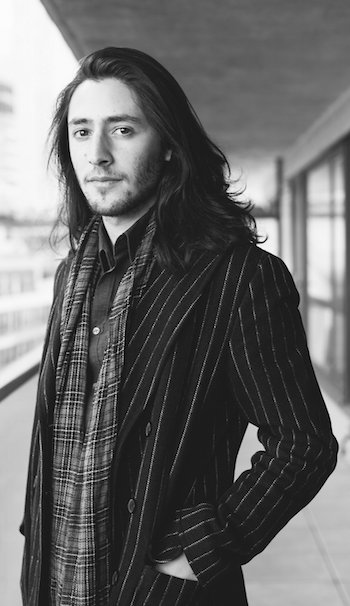Composer’s arrows hit the target at Spectrum’s Rzewski Festival

Gabriel Zucker performed at the Rzewski Festival Tuesday night at Spectrum.
The brave enterprise that is the Rzewski Festival at Brooklyn’s Spectrum venue took another big step forward Tuesday night with arresting performances of five works for piano, the instrument that dominates composer Frederic Rzewski’s output.
Five pianists participated in the event, instigated and hosted by Gabriel Zucker, who also gave the evening’s standout performance. On a night when technical proficiency and musical insight were in abundance, Zucker’s rendering of Rzewski’s Squares took things to the next level, creating the illusion of the music itself speaking, rather than a player interpreting a score.
This despite Rzewski’s often-gnarly writing for the instrument, which any pianist would deserve a medal just for wading through. The fistfuls of notes that Zucker flung across the keyboard in this 1978 suite were always driven by the musical impulse, and artfully phrased amid the pandemonium.
Although the language of Romanticism is one of many arrows in Rzewski’s quiver, he makes no Chopinesque attempts to conceal the piano’s percussive nature, opting instead to cultivate a wide range of percussive colors from the hardest marcato to the gentlest caress. All of Tuesday’s pianists got that, with Zucker’s palette the broadest and most nuanced of all.
Because of his choice of subject matter, Rzewski tends to be pigeonholed as a populist, social-protest composer, but as a musical figure he seems to most resemble Brahms, another composer with a lot of arrows. Folk music and twelve-tone rows, jazz and fugue, impressionism and Sächlichkeit coexist in his highly individual idiom, which, as this festival reveals, the now 80-year-old composer has continued to develop over the decades as musical fads came and went.
The program’s first work, a volatile 1999 piece aptly titled Fantasia, served to introduce Rzewski’s kaleidoscopic style in a mashup that recalled Bill Evans, Bartók, Mussorgsky, and Schumann in the space of a few seconds. Pianist Robert Satterlee’s layered playing somehow made sense of it all and kept it moving.
Satterlee also excelled in the witty left-hand piece Second Hand, or Alone at Last (2005), in which the pianist’s left hand portrayed the accompanist on holiday, roaming alone all over the keyboard, executing death-defying leaps, singing in big rolled chords, coordinating with the pianist’s left foot on the middle pedal in novel sustain-staccato textures, and generally having a ball. Eschewing all two-hand illusions (as in pieces like Scriabin’s left-hand Nocturne), this was definitely the sound of one hand clapping.
The number of hands suddenly quadrupled as the veteran pianists Ursula Oppens and Jerome Lowenthal took the bench for a fluent yet incisive performance of the wonderfully intricate 2012 piece Four Hands. Looking and sounding the part of a long-married couple, Oppens and Lowenthal completed each other’s sentences, squabbled and played toppers, reaching over each other to execute the ancient melody-sharing technique called hocketing.
As Lowenthal pointed out in a program note, the work’s closing fugue on a lively subject was a particularly Brahmsian moment, recalling that composer’s brawny Handel Variations, Op. 24.
As noted, pianist Zucker rendered the mixed bag of four pieces titled Squares with rare verve and eloquence. The aptly-named “Squall” was alternately raging and frozen. “Hyenas” stoutly protested the domination of the poor by the powerful, with Zucker somehow managing simultaneously to phrase two lines in conflicting rhythms, as if each of his hands had its own brain.
More Mussorgsky and an impish Debussy seemed to inspire the bug-scherzo “Noctamble.” “Sideshow” swung into a ragtime rhythm, humorously mixing staccato and legato, leggiero and marcato, before launching into more of those dazzling, dissonant sprays of notes.
As sensitively performed by Carl Patrick Bolleia, “Dreadful Memories,” the first song setting in the frankly populist set North American Ballads (1979), was mellifluous in a gently dissonant parlor style à la Ives. “Which Side Are You On?” swelled from a softly determined march to an ecstatic scherzo of flitting scales and tremolos before booming out its title tune at the end.
At first, “Down by the Riverside” ambled deceptively along like a cowboy ballad, but powerful contrasts, hazy one moment and violent the next, were just around the corner.
All these substantial movements demanded, and got, enormous concentration and stamina from Bolleia, and none more so than “Winnsboro Cotton Mill Blues,” with its page after page of unwavering, ominous machine rumble in the bass and its glowing blues melody at mid-piece. Somehow, the pianist mustered still more energy to bring this taxing piece to its fierce conclusion.
The Rzewski Festival continues with pianists Leah Asher, Nicolee Kuester, Ross Aftel, and John Ling, 7 p.m. Wednesday at Spectrum, 70 Flushing Avenue, Brooklyn. spectrumnyc.com; tickets at the door.






